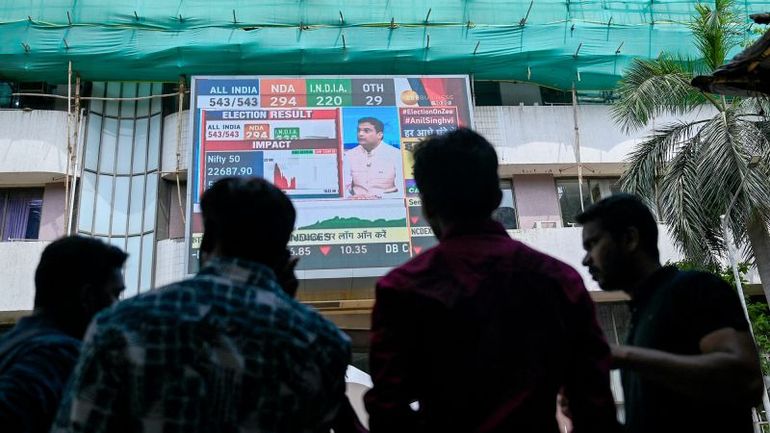
Indian Stock Market Faces Major Decline Amid Modi's Election Disappointment

The Indian stock market experienced a significant decline as the election results indicated Prime Minister Narendra Modi may not secure a decisive victory, casting uncertainty on his plans for economic reforms.
Indian stocks took a nosedive on Tuesday as the election results hinted that Prime Minister Narendra Modi may not win by a large margin, casting uncertainty on his plans for stronger economic reforms.
The Sensex index, following 30 major companies, and the Nifty 50 index both dropped by almost 6% by the end of the day.
The world's biggest election concluded on Saturday, with the worst daily drop for Indian stocks since 2020 happening just 24 hours after both indexes hit record highs. This drop came as weekend exit polls suggested a strong victory for Modi.
The 73-year-old Prime Minister ran on his economic record of the past 10 years, a period of strong growth for India. His Bharatiya Janata Party (BJP) was seeking a 400-seat supermajority in the 543-seat lower house of parliament. However, preliminary results indicate that the opposition Congress party is performing better than some analysts had anticipated.
In India’s last election in 2019, the BJP won 303 seats, surpassing the 272 seats needed to form a government. If the final results show that Modi has not met expectations in the polls, important economic reforms could be delayed.
Yashovardhan Khemka, Senior Manager, Research & Analytics at Mumbai-based asset management firm Abans Holdings, mentioned that the early election results are indicating that the current BJP government is falling short of the halfway mark of 272 seats, suggesting the possibility of a coalition government.
He also pointed out that this situation would result in the government having to rely on allies to make important policy decisions. This could potentially lead to policy paralysis and create uncertainty in the functioning of the government.
India is currently the world's fastest growing major economy. Analysts believe that in order to become an economic superpower, India needs to achieve a growth rate of 8% or more.
If India can sustain this growth, it is projected to move up the ranks of the world's biggest economies. Some experts even predict that by 2027, India could be ranked third, following only the United States and China.
The stock markets in India have shown strong performance under Modi's leadership. According to the World Federation of Exchanges, the National Stock Exchange of India (NSE) recently surpassed both the Shenzhen Stock Exchange and the Hong Kong Exchange to become the sixth largest in the world.
However, some investors have raised concerns about the expensive valuation of Indian stocks. Analysts suggest that a market correction could be beneficial for the overall health of the markets.
Manish Jain, head of institutional business at Mirae Asset Capital Markets, believes that if valuations become more reasonable in the future, it will lead to increased investments in India. He sees India as a long-term structural growth story.
This report also includes contributions from Anna Cooban.
Editor's P/S:
Paragraph 1:
The market's reaction to the uncertain election results in India highlights the importance of political stability for economic growth and investment. While Prime Minister Modi has been credited with overseeing a period of strong economic expansion, the possibility of a coalition government or a reduced majority could introduce uncertainty and delay crucial reforms. This underscores the interrelationship between politics and economics, with investors and analysts closely monitoring political developments for their implications on the business environment and market sentiment.
Paragraph 2:
Despite the recent market correction, experts remain optimistic about India's long-term economic potential. The country's rapid growth, coupled with its large population and growing consumer base, makes it an attractive destination for investors seeking opportunities in emerging markets. The recent performance of the National Stock Exchange of India, which has become one of the largest in the world, is a testament to the strength and potential of India's financial sector. While some analysts suggest a market correction may be necessary to adjust valuations, many believe that India's structural growth story remains compelling and offers significant opportunities for investors who are willing to embrace volatility and uncertainty in the short term.













